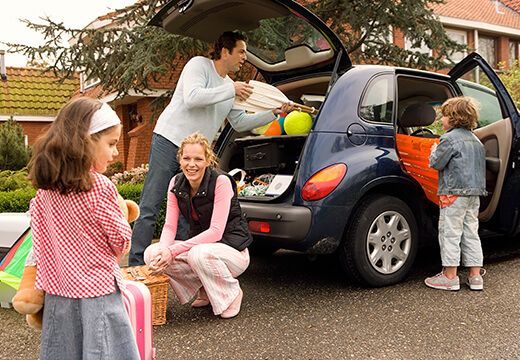As the climate extreme-weather-preparation changes, wildfires have become more frequent and more severe. Warmer, drier temperatures from May to September lead to longer, more intense fire seasons. While communities in forested areas are particularly vulnerable, even those living in major urban areas feel the impacts through reduced air quality.
Here are essential wildfire safety tips and facts for all Canadians.
How do wildfires start?
Most naturally occurring wildfires in Canada start when lightning strikes a tree or another fuel source. Since these fires often happen in remote locations, they account for roughly 80% of the total area burned by wildfires. Human-caused fires generally happen in more populated areas and are extinguished quicker. Still, it’s important to be cautious and comply with fire bans during high risk periods.
Wildfire safety for forested communities
Increased development in heavily forested areas puts communities in the direct path of wildfires. While there’s no way to eliminate all risk, taking preventative measures can reduce the chance of damage to your home and belongings. Each spring, here’s how to prepare for wildfire season:
- Stock a wildfire survival kit with emergency supplies to last 72 hours. Here’s what to include.
- Create a home inventory or take photographs of your belongings.
- Clear branches, leaves and other debris from your gutter, roof, under your deck and around your property.
- Store wood at least 10 meters away from your dwelling.
- Keep your lawn trimmed to 10 centimeters or less.
If a wildfire warning is issued for your community, take these precautions if you’re able and it’s safe to do so:
- Move combustibles like propane barbeques, lawn mowers and gas cans at least 10 metres away from structures.
- Check that your property is clear of leaves, branches and debris that could quickly catch fire.
- Move items like toys, patio furniture and cushions inside your garage or dwelling.
- Close all windows and doors. Apply tape over vents and move combustibles away from windows.
- Turn off your thermostat to prevent your air conditioner from drawing smoke into your home.
- Pack your car with essentials and make sure you have a full tank of gas.
- Evacuate immediately if needed, even if the above steps aren’t completed.
If you have to evacuate, stay away until local authorities lift the evacuation order. When you return home, be watchful of structural damage caused by the fire. Roofs and floors may be subject to collapse. Wear steel-toe footwear with a sole plate and other protective clothing such as pants, long sleeves, gloves and hard hats. Throw away food, beverages and medicine that were exposed to heat, smoke, soot or water.
For insurance purposes, document any damage you may have to your belongings by taking a photo or video prior to discarding. Keep receipts for expenses you have while you’re evacuated.
How wildfires impact urban areas
Even if your city or town is not in the direct path of a wildfire, air quality may be compromised by drifting smoke. The risk of respiratory and cardiovascular problems increase over time with continued exposure. If there’s an air quality advisory for your area:
- Stay indoors as much as possible and avoid exercising outside.
- Drive with the windows up and set the air to recirculate.
- Check air advisories often. Don’t rely solely on what it looks like outside.
- Invest in an air purifier. A good air purifier can reduce particle levels inside your home.
Make your home wildfire resilient
Development standards play a significant role in reducing the potential impact of these fires.
If you’re in the process of building a new home, or renovating an existing property, watch this video to find out how you can reduce your wildfire risk.
Video produced by FireSmart Canada
For more wildfire home building, renovation and maintenance tips, download the FireSmart Home Development Guide*.
Co-operators has partnered with FireSmart Canada since 2015. FireSmart Canada leads the development of resources and programs designed to empower the public and increase community resilience to wildfires across Canada. We collaborated to develop and publish this Home Development Guide, which outlines specific measures homeowners can take to reduce the risk of wildfire property damage.





 Home
Home
 Auto
Auto
 Life
Life
 Recreation
Recreation

